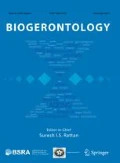Abstract
The developmental conditions of Drosophila melanogaster flies can modify the phenotypic traits of adults. However, the control of these conditions is neglected by some authors in their articles and the readers are unaware, for instance, whether flies developed in crowded cultures or fed on a new or used medium. Controlling developmental conditions allows to know precisely the viability of flies, their duration of development and sex-ratio, which can be warning signals of bad rearing conditions. As developmental conditions can modify the results of experiments on the effects of ageing it is necessary to strictly control them.

Similar content being viewed by others
References
Botella LM, Moya A, Gonzalez MC, Ménsua JL (1985) Larval stop, delayed development and survival in overcrowded cultures of Drosophila melanogaster: effect of urea and uric acid. J Insect Physiol 31:179–185
Everman ER, Delzeit JL, Hunter FK, Gleason JM, Morgan TJ (2018) Cost of cold acclimation on survival and reproductive behavior in Drosophila melanogaster. Plos One 13:e0197822
Henry Y, Renault D, Colinet H (2018) Hormesis-like effect of mild larval crowding on thermotolerance in Drosophila flies. J Exp Biol 221pii:jeb169342
Kern S, Ackermann M, Stearns SC, Kawecki TJ (2001) Decline in offspring viability as a manifestation of aging in Drosophila melanogaster. Evolution 55:1822–1831
Klepsatel P, Procházka E, Gáliková M (2018) Crowding of Drosophila larvae affects lifespan and other life-history traits via reduced availability of dietary yeast. Exp Gerontol 110:298–308
Le Bourg E (2011) The NF-kB like factor DIF has weaker effects on Drosophila melanogaster immune defenses than previously thought. J Comp Physiol B 181:741–750
Lints FA, Lints CV (1969a) Respiration in Drosophila. III influence of preimaginal environment on respiration and ageing in Drosophila melanogaster hybrids. Exp Gerontol 4:81–94
Lints FA, Lints CV (1969b) Influence of preimaginal environment on fecundity and aging in Drosophila melanogaster hybrids. I. Preimaginal population density. Exp Gerontol 4:231–244
Lushchak OV, Karaman HS, Kozeretska IA, Koliada AK, Zabuga OG, Pisaruk AV, Koshel NM, Mechova LV, Inomistova MV, Khranovska NM, Vaiserman AM (2019) Larval crowding results in hormesis-like effects on longevity in Drosophila: timing of eclosion as a model. Biogerontology 20:191–201
Moya A, Botella LM (1985) Larva-to-adult and pupa-to-adult mortality dynamics in crowded cultures of Drosophila melanogaster. Genetica 67:201–207
Ormerod KG, LePine OK, Abbineni PS, Bridgeman JM, Coorssen JR, Mercier AJ, Tattersall GJ (2017) Drosophila development, physiology, behavior, and lifespan are influenced by altered dietary composition. Fly 11:153–170
Osmond C, Barker DJP, Winter PD, Fall CHD, Simmonds SJ (1993) Early growth and death from cardiovascular disease in women. Brit Med J 307:1519–1524
Preston JD, Reynolds LJ, Pearson KJ (2018) Developmental origins of health span and life span: a mini-review. Gerontology 64:237–245
Rovenko BM, Perkhulyn NV, Gospodaryov DV, Sanz A, Lushchak OV, Lushchak VI (2015) High consumption of fructose rather than glucose promotes a diet-induced obese phenotype in Drosophila melanogaster. Comp Biochem Physiol A Mol Integr Physiol 180:75–85
Rutschmann S, Jung AC, Hetru C, Reichhart JM, Hoffmann JA, Ferrandon D (2000) The Rel protein DIF mediates the antifungal but not the antibacterial host defense in Drosophila. Immunity 12:569–580
Strilbytska O, Velianyk V, Burdyliuk N, Yurkevych IS, Vaiserman A, Storey KB, Pospisilik A, Lushchak O (2020) Parental dietary protein-to-carbohydrate ratio affects offspring lifespan and metabolism in Drosophila. Comp Biochem Physiol A Mol Integr Physiol 241:110622
Tarry-Adkins JL, Ozanne SE (2017) Nutrition in early life and age-associated diseases. Ageing Res Rev 39:96–105
Vaiserman A, Koliada A, Lushchak O (2018) Developmental programming of aging trajectory. Ageing Res Rev 47:105–122
van Abeelen AF, Veenendaal MV, Painter RC, De Rooij SR, Dijkgraaf MG, Bossuyt PM, Elias SG, Grobbee DE, Uiterwaal CS, Roseboom TJ (2012) Survival effects of prenatal famine exposure. Am J Clin Nutr 95:179–183
Zwaan BJ, Bijlsma R, Hoekstra RF (1991) On the developmental theory of ageing. I. Starvation resistance and longevity in Drosophila melanogaster in relation to pre-adult breeding conditions. Heredity 66:29–39
Author information
Authors and Affiliations
Corresponding author
Additional information
Publisher’s note
Springer Nature remains neutral with regard to jurisdictional claims in published maps and institutional affiliations.
Rights and permissions
About this article
Cite this article
Le Bourg, E. Neglecting larval rearing conditions in Drosophila melanogaster can negatively impact research on ageing. Biogerontology 22, 369–373 (2021). https://doi.org/10.1007/s10522-021-09917-y
Received:
Accepted:
Published:
Issue Date:
DOI: https://doi.org/10.1007/s10522-021-09917-y




